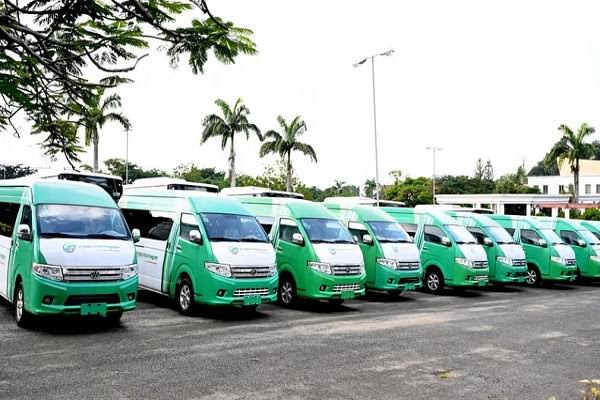The Nigerian Federal Government has embarked on a significant initiative to modernize and decarbonize its transportation sector, particularly within the aviation industry. This initiative involves the deployment of locally assembled Compressed Natural Gas (CNG) buses for airport shuttle services across the nation. The first batch of these buses, produced by Lanre Shittu Motors, a prominent Nigerian automobile assembly company, has been officially handed over to the Federal Airports Authority of Nigeria (FAAN) at the Murtala Muhammed Airport in Lagos. This move marks a pivotal step towards achieving the government’s objectives of reducing carbon emissions, promoting sustainable transportation, and mitigating the economic impact of fuel subsidy removal.
The introduction of CNG-powered buses for airport shuttle services aligns with the directives of President Bola Tinubu and underscores Nigeria’s commitment to meeting global climate targets. The Minister of Aviation and Aerospace Management, Festus Keyamo, emphasized that this initiative is a practical demonstration of the government’s dedication to transitioning from traditional fossil fuels to cleaner energy sources. The CNG buses are touted as environmentally friendly, producing zero emissions, and are designed with accessibility features to cater to individuals with disabilities. This reflects a holistic approach to sustainable transportation that considers both environmental and social inclusivity aspects.
The deployment of CNG buses is not limited to airport shuttles; it forms part of a broader national strategy to promote the adoption of CNG as a viable alternative fuel for vehicles. This strategy aims to reduce the nation’s dependence on petrol and diesel, thereby mitigating the economic consequences of the recent fuel subsidy removal. The government’s commitment to this transition is evident in its investment in the local assembly of these buses, which not only promotes local manufacturing but also contributes to job creation and economic diversification. This initiative signals a long-term commitment to sustainable transportation and energy security.
The CNG buses procured by FAAN are manufactured in two variants to cater to different transportation needs. The 31-seater variant is specifically designed for airport shuttle services, providing efficient and comfortable transportation for passengers within airport premises. The 54-seater variant, on the other hand, is intended for mass transit within cities, further solidifying the government’s commitment to promoting CNG-powered transportation across various segments of the public transport system. Both variants are equipped with modern amenities such as air conditioning, viewing screens, and charging ports to enhance passenger comfort and convenience.
Lanre Shittu Motors, the company responsible for assembling these buses, has a reputation for delivering quality vehicles tailored to the Nigerian market. The company’s Managing Director, Taiwo Shittu, highlighted the features and specifications of the buses, emphasizing their suitability for both airport shuttles and urban mass transit. The local assembly of these buses not only ensures adherence to local standards and regulations but also contributes to the development of the domestic automotive industry. This partnership between the government and a local manufacturer demonstrates a commitment to promoting indigenous capacity and expertise in the automotive sector.
The introduction of CNG-powered buses represents a significant step forward in Nigeria’s pursuit of sustainable transportation. This initiative addresses multiple challenges, including reducing carbon emissions, promoting cleaner air quality, and mitigating the economic impact of fuel subsidy removal. By investing in locally assembled CNG buses, the government is not only modernizing its transportation infrastructure but also fostering economic growth and creating jobs. This holistic approach to sustainable development underscores the government’s commitment to creating a more environmentally friendly and economically resilient future for Nigeria. The successful deployment of these buses is expected to serve as a model for other sectors and encourage wider adoption of CNG as a viable alternative fuel source.














